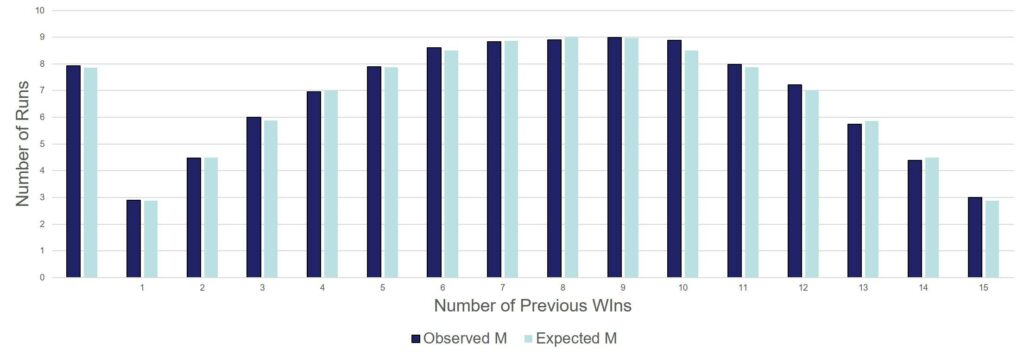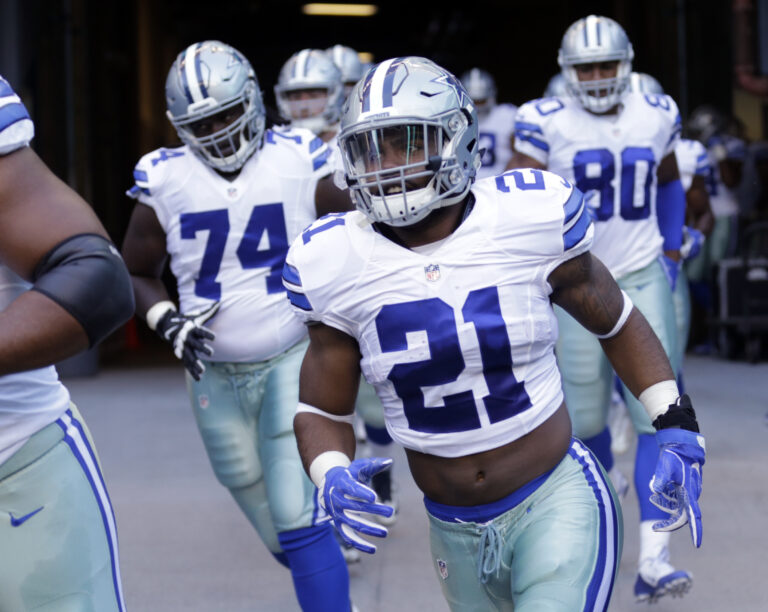After New England Patriots quarterback Tom Brady brought his team from 25 points down to steal the Super Bowl from the Atlanta Falcons, Fox Sports commentator Joe Buck stated that the Patriots had “redefined momentum here tonight.”
It was an incredible comeback, and one that will be remembered forever in football lore. But in terms of Joe Buck’s statement, some exception must be taken by the audience. In reality, the Patriots may have just validated the basis for this research, not re-defined momentum.
We constantly here about “momentum” in the NFL. In 2016, after a 13-2 start, the Dallas Cowboys decided to rest their starters prior to a bye week. They proceeded to lose their final two games, and caught plenty of heat from fans and media about giving up their momentum.
To address both Buck’s comments and the comments of sports pundits everywhere, we ask; is momentum real or merely in the eye of the beholder? Could “momentum” simply be an illusion, and not something that effects game results?
In order to answer these questions, Dr. John Ruscio and I analyzed between game NFL data between the years of 1978 and 2016. The complete sequence of wins and losses for each team’s season was found on ProFootballReference.com, for a total of N = 1,169 seasons.
Data from the two strike-shortened seasons (1982 and 1987) were dropped, leaving N = 1,1141 seasons. Next, seasons consisting of only wins (the 2007 New England Patriots) or only losses (the 2008 Detroit Lions) were omitted from the data set.
Finally, to restrict analyses to wins and losses, all seasons that contained a comparatively rare tie were omitted from the data set, resulting in the final sample of N = 1,075 seasons. Data for each team’s season included all regular season and playoff games. Wins were coded as 1, losses as 0, ties as .5, and bye weeks as 2.
To compare data, we created 1,000 samples of “chance” data. Re-sampling techniques were used to model a random dispersion of wins and losses, holding constant overall team strength. This was done by randomly shuffling the order of wins and losses within a season, while holding constant the team’s total win-loss record and the location of any bye weeks.
In simpler terms, if a team had went 10-6, we used re-sampling techniques to create chance level data by shuffling those 10 wins and 6 losses around to random sequences 1,000 times.
The Questions
Through a series of statistical analyses, we examined a few hypotheses.
First, do bye weeks affect momentum? Assuming the momentum effect exists, then bye weeks should disrupt or end streaks. Next, does the number of runs in a season differ from chance? Momentum would predict a smaller number of runs per season than expected by chance, as team’s streaks will be clustered together.
Next, are games correlated sequentially? Momentum predicts more wins after wins, and losses after losses than expected by chance. Also, how common are winning and losing streaks? Momentum predicts more lengthy streaks than expected by chance.
And, lastly, how many previous games best predict the outcome of a team’s next game? If the momentum effect is real, then the most recent games should best predict a team’s next game.
The Results
What we found disputed all conventional football wisdom.
First, when analyzing bye weeks, we found they had no negative effects on the outcome of a team’s next game. In fact, bye weeks actually increased winning percentages post-bye week from about 3%.
So, instead of “killing” momentum, it appears that bye weeks go a long way in improving a team’s chances to win the very next week. Still, more research should be done before concluding anything too definite about bye weeks.

The next question we analyzed was if the number of runs in a season differed from chance. Momentum would predict that team’s win and loss streaks will be clustered together, creating fewer runs. However, our data found no evidence of a momentum effect, as the number of runs per season rarely differed significantly from chance.

Let me skip down to the most important of our results, however, since I know this is getting a bit boring for most. Most prior momentum research in sports has tested things similar to us, but our most unique research came when asking how many previous games best predict the outcome of a team’s next game.
Everyone seems to believe that if you’ve won two in a row, you’re much more likely to win game three than if you’ve lost the previous two games. However, statistical theory would predict the team’s first 7,8,9…16 games would be better predictors of future performance than the team’s “latest” game.
Of course, conventional wisdom and momentum disagree with statistical theory, but based on our research, conventional wisdom is incorrect.

Here’s an example of two of our graphs. As you can see, they both have upward slopes, meaning that as the season progresses, predictions for the team’s next game become more accurate. There is also a good match between the observed results (actual NFL data) and our chance-level expectations.
In other words, it’s time to retire the recency bias and reactionary analysis we get in sports. Just because the Cowboys may have lost week one, that doesn’t mean they are about to spiral down for three or four straight losses.
The true predictor of a team’s value comes weeks into the season. For example, when the Cowboys get to 11-1, not when they are 0-1. Patience should be preached, as it is clear the public overreacts to “momentum” after each game.
I know this all is a bit nerdy, but I hope you guys can enjoy a statistical look into the sport we all love. This upcoming year I will be working on coding and analyzing within-game momentum in the NFL. For example, how does a turnover or a dropped pass effect the result of the ensuing drive.
This will be tough, but I am excited to see what the data will say. It is certainly easier for a former football player like myself to believe in within-game momentum than it is to believe in between game momentum.

The Entire NFL is an illusion. The problem is nobody will face it… The NFL filed the same paperwork the WWE filed… that basically says… “This is sports entertainment.” WHICH means legally the NFL can change and shape any outcome to their liking…. means an adult male soap opera and it’s legal. YET sheeple continue to believe that there is this ‘real’ competition.